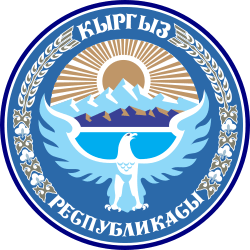Supreme Council (Kyrgyzstan)
| Supreme Council Жогорку Кеңеш | |
|---|---|
| 7th Supreme Council | |
 | |
| Type | |
| Type | |
| Leadership | |
Speaker | |
Prime Minister | |
| Structure | |
| Seats | 120 |
 | |
Political groups |
Bir Bol (12)
|
| Elections | |
| Party list proportional representation | |
Last election | 4 October 2015 |
| Website | |
|
www | |
 |
| This article is part of a series on the politics and government of Kyrgyzstan |
| Constitution |
| Legislative |
|
Related topics |
The Supreme Council (Kyrgyz: Жогорку Кеңеш, transliterated as Coğorqu Keñeş or Jogorku Keňeş, جوعورقۇ كەڭەش) ([dʒoʁorqu keŋeʃ]) is the unicameral Parliament of Kyrgyzstan. It has 120 seats with members elected for a five-year term by party-list proportional voting.
History
From 1991, when Kyrgyzstan gained independence from the Soviet Union, until October 2007, when the Constitution was changed in a referendum, the Supreme Council consisted of the Legislative Assembly (Myizam Chygaruu Jyiyny, the upper house) and the Assembly of People's Representatives (El Okuldor Jyiyny, lower house) with 60 and 45 members, respectively. The members of both houses were elected to five-year terms. In the Assembly of People's Representatives all 45 members were elected in single-seat constituencies; in the Legislative Assembly 45 members were elected in single-seat constituencies and 15 were elected through party lists.
Since October 2007, the Supreme Council is a unicameral legislature. Originally it consisted of 90 members, however when in 2010 President Kurmanbek Bakiyev was ousted after riots, a new Constitution was adopted, that increased the number of members to 120. Parties are limited to 65 seats in order to prevent power concentration.
Last elections
- Kyrgyzstani parliamentary election, 2015
- Kyrgyzstani parliamentary election, 2010
- Kyrgyzstani parliamentary election, 2007
2005 parliamentary election
The 2005 Kyrgyz parliamentary elections were held in February and March 2005. More than 400 candidates ran for the new 75-member unicameral legislative assembly. There were two rounds of voting held on 27 February and 13 March. Six seats were won by opposition politicians. Most candidates were officially independent. International observers said the elections fell short of international standards for democratic elections in several important areas. Widespread protests over alleged rigging of the election by the government culminated in the Tulip Revolution on 24 March. Revolutionaries overthrew President Askar Akayev.
See also
- List of Chairmen of the Supreme Soviet of the Kyrgyz Soviet Socialist Republic
- List of Chairmen of the Legislative Assembly of Kyrgyzstan
- List of Chairmen of the Assembly of People's Representatives of Kyrgyzstan
- Politics of Kyrgyzstan
- List of legislatures by country
External links
- Parliament website
- Kyrgyzstan information page on the website of Asian Medical Institute Kyrgyzstan
- Kyrgyzstan information page on the website of Medical Institute,Osh State University Kyrgyzstan